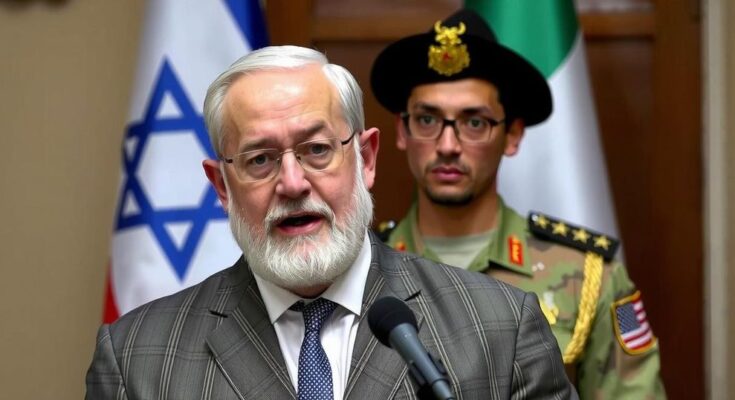Ayatollah Khamenei indicated that Israel is mistaken about the uprising’s status, particularly regarding Syria, while the Italian Defense Minister plans a visit to Israel. Palestinian families are suing the U.S. over its support for the IDF amidst ongoing conflicts, and normalization between Israel and Saudi Arabia is linked to the end of the Gaza war. Hostage deal negotiations with Hamas are reportedly progressing well.
Ayatollah Ali Khamenei, the Supreme Leader of Iran, asserted that Israel is “gravely mistaken” in believing that the uprising against it has concluded, particularly in light of developments in Syria. In a message shared via his Hebrew-language social media platform, Khamenei remarked that the movements among Syrian youth would lead to the liberation of territories occupied by Israel. Concurrently, the Italian Defense Minister Guido Crosetto is scheduled to visit Israel next week to discuss security matters with Defense Minister Israel Katz.
Simultaneously, Palestinian families have filed a lawsuit against the U.S. State Department regarding its support for the Israel Defense Forces (IDF) during the ongoing conflict in Gaza, which has resulted in significant casualties. The criticism of U.S. policies in the region continues to mount, particularly concerning its support for Israel.
On another diplomatic front, Saudi officials have indicated that normalization between Israel and Saudi Arabia hinges upon the conclusion of the ongoing conflict in Gaza. This reflects a broader apprehension among Arab nations about escalating tensions and humanitarian crises in the region.
Additional reports indicate optimism in negotiations regarding a hostage deal involving Hamas and Israel, with expectations for a resolution within the upcoming month. This context of ongoing dialogues surrounding hostages and regional stability underscores the complexities of Middle Eastern politics.
The current geopolitical landscape reflects heightened tensions in the Middle East, primarily stemming from the ongoing Israeli-Palestinian conflict and the regional implications of Iranian influence. Ayatollah Khamenei’s remarks come against the backdrop of a heightened Iranian consolidation of power, particularly through the Revolutionary Guards, who dominate significant portions of Iran’s oil exports—critical for funding regional proxies. Additionally, international diplomatic efforts are ongoing to address the Iranian nuclear situation and facilitate potential peace agreements involving Israel and its Arab neighbors. The intricate dynamics surrounding these issues reflect long-standing historical grievances and contemporary humanitarian concerns, especially amid increasing violence and displaced populations.
In summary, Ayatollah Khamenei’s statements highlight Iran’s ambitions to sustain regional influence amidst shifting geopolitical dynamics. The complex interplay of reactions from the United States, Israel, and Saudi Arabia reflects ongoing tensions driven by both historical and contemporary grievances. The potential for normalization between Israel and Saudi Arabia appears contingent upon a resolution of hostilities in Gaza, while negotiations for a hostage agreement with Hamas are progressing. The situation remains fluid, demanding attentive observation from international stakeholders.
Original Source: www.jpost.com




